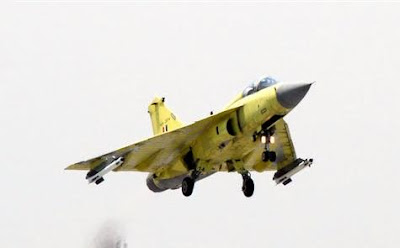 Tejas LSP4 during test (photo : bharat rakshak)
Tejas LSP4 during test (photo : bharat rakshak)
BENGALURU, India — The fourth limited series production (LSP-4) model of India’s light combat aircraft (LCA) Tejas had its successful first flight at Hindustan Aeronautics Limited’s military airport here in Bengaluru on June 2.
The flight, piloted by Group Capt. Suneet Krishna of the National Flight Test Center (NFTC), lasted 40 min. The pilot went supersonic and later recovered the full flight envelope, exhibiting confidence in the system.
As with the April 23 first flight of LSP-3, during the June 2 flight the LSP-4 carried the Elta multi-mode radar (MMR) onboard. The LSP-4 aircraft is the 10th test vehicle to join the flight line. Tejas is slated to receive initial operational clearance (IOC) by December, paving way for its induction into the Indian Air Force (IAF).
Vice Chief of IAF Air Marshal P.K. Barbora told AVIATION WEEK that the first flight of LSP-4 is “one step forward” in the project.
“As you move along in a program, you will overcome problems quickly. Now the LSP-5, 6 and 7 will come,” he said. “It’s a proud moment and we are also keenly awaiting the arrival of LCA Mk-II in the years to come, which will be an advanced platform.”
P.S. Subramanyam, program director for combat aircraft and director of the Aeronautics Development Agency, told AVIATION WEEK that the project is moving toward IOC.

Tejas 2 seat version (image : keypublishing)
“The LSP-4 is equipped fully to the standards of IOC,” Subramanyam said. “We are left with a few more flight tests and then Tejas [should] reach the much-awaited target.” The Tejas team will now head for hot weather trials, which are likely to be held at Nagpur.
On June 2, the pilot flew the aircraft to an altitude of 11 km. (7 mi.) and went supersonic, reaching Mach 1.1 with Test Director Group Capt. D. Chakravorty guiding the flight from the NFTC telemetry facility. For the first time, Tejas flew in the configuration that will be ultimately delivered to the IAF. Group Capt. Suneet flew the LCA prototype vehicle (PV-1) in 2003.
HAL Chairman Ashok Nayak says that the successful flights of LSP-3 and LSP-4 in quick succession are an indication of the accelerated pace at which the program is now being run.
In addition to the MMR, the LSP-4 had an onboard radar warning receiver, [an] electronic countermeasure system (ECM), and new avionics software.
“Tejas-LSP-4 is the final configuration of [the] IAF version,” an ADA source said. “Now all the hardware items have come onboard and there won’t be anymore additional systems, barring some software changes. All objectives have been met and all systems worked as per the design. IAF pilots from [the] operational front [will] soon fly LCA.”
IAF sources said the LCA program’s recent progress has been a huge boost to the force’s confidence in the wake of delays and cost overruns.
“We are all keen to see the Tejas induction,” a senior-ranked IAF official with Air Headquarters said. “After having waited for so many years, investing so many man hours, review meetings and money, it’s ... natural to become anxious. It’s heartening to see the platform is taking definite shape and heading in the right direction.”